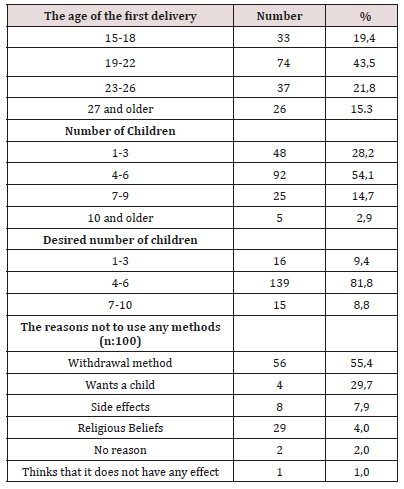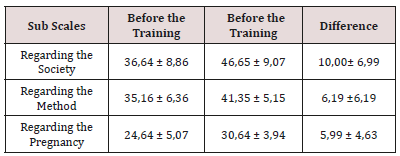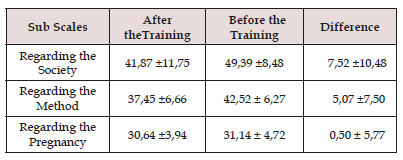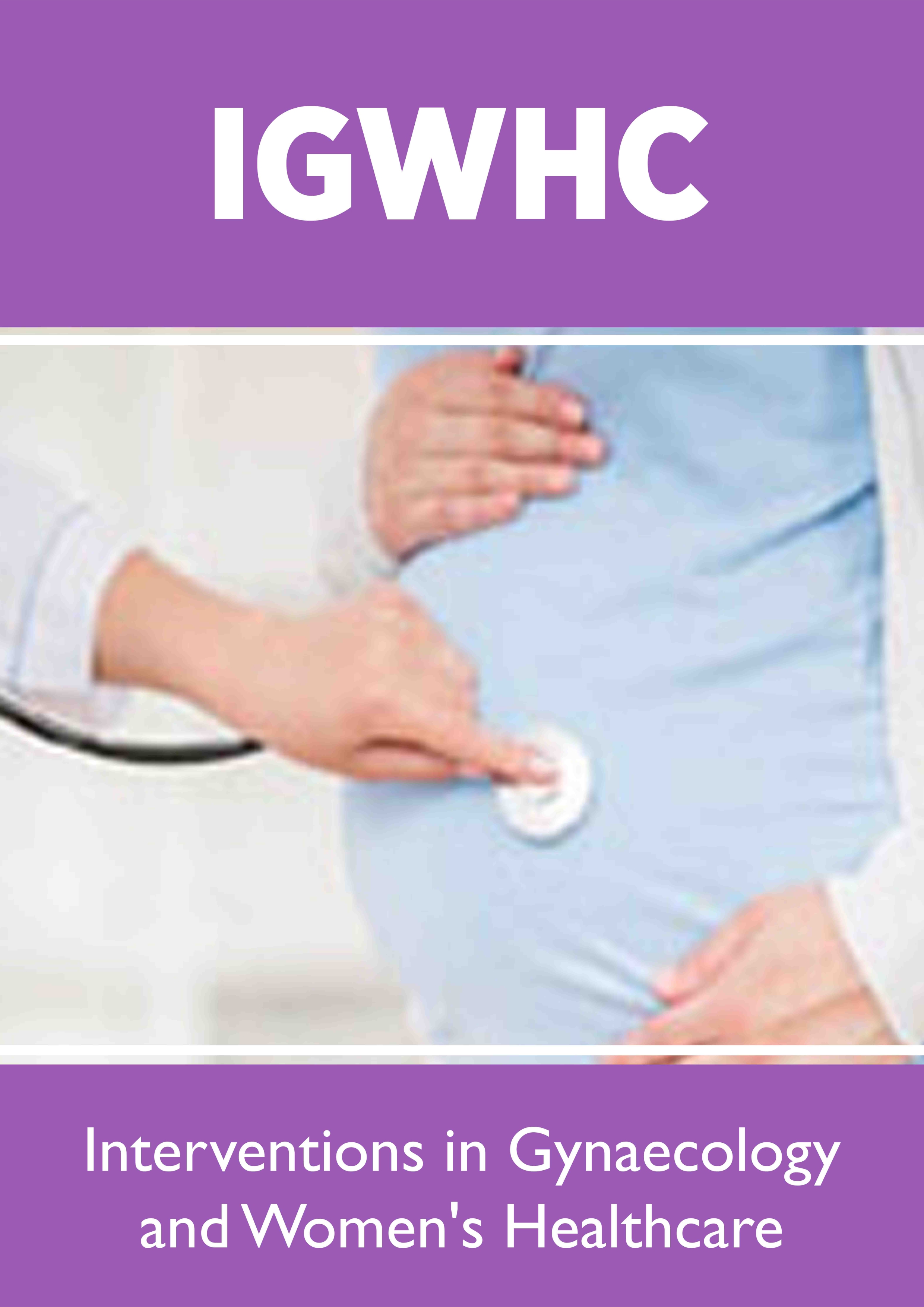
Lupine Publishers Group
Lupine Publishers
Menu
ISSN: 2637-4544
Research Article(ISSN: 2637-4544) 
Attitudes of Married Women with Advanced Maternal Age and their Spouses Towards Family Planning and Evaluation of the Effects of Trainings related to This Issue Volume 3 - Issue 1
Gülcan Çiftçioğlu* and Belkıs Karataş
- Mardin Artuklu University, School of Healthy, Turkey
Received:January 31, 2019; Published: February 20, 2019
Corresponding author: Gülcan Çiftçioğlu, Mardin Artuklu University, School of Healthy, Turkey
DOI: 10.32474/IGWHC.2019.03.000155
Abstract
Purpose: In this study, we aimed to evaluate the attitudes of married women with advanced maternal age and their spouses towards family planning and to assess the effects of training related to this issue.
Design: The sample group of the study was composed of 170 women and their spouses who were registered to the three health clinics located in Kiziltepe district of Mardin province. Participants were selected according to the family planning attitude scale results.
Results: When we evaluate the mean attitude scale scores of both women and their spouses before and after the trainings, it can be concluded that trainings positively affected the attitudes of them towards the family planning.
Implications: Trainings are effective in changing attitudes and behaviors of individuals who are strongly are engaged in traditional cultural characteristics.
Keywords: Family planning; Attitude scale; Nursing, Education; Culture, Mardin
Introduction
Family planning is defined as that all couples and individuals have right to have desired number of children, to decide the duration between the births freely and responsibly, and to have knowledge, tools and education in this regard. In other words, Family Planning is a protective service which allows married couples to have desired number of children according to their economical possibilities and personal wishes, and it ensures the couples to have births at appropriate intervals in accordance with the maternal and child health William et al. [1], Yıldırım [2]. Population growth has been the determinative factor in Family planning service requirements of countries. According to the World Bank reports between 2004 and 2020, the average population growth rates of come countries are estimated as follows; India (1.3), Ireland (1.2), Mexico (1.1), USA (0.9), Canada (0.8), China (0.6), Norway (0.5), Netherlands and the UK (0.3), Greece (0.1), Germany and Italy (0), Japan (-0.1). On the other hand, the population growth rate in Turkey in the same time interval will be higher than the world average (1.2 and 1.1). This population growth rate of Turkey will be one of the highest population growth rates in the world and Turkey will be one of the three countries in this regard (India and Ireland) with the highest rates Ulusoy [3], Population and the Environment [4].
In each minute, 380 women conceive, 190 women are faced with an unplanned or undesired pregnancy, 100 women experience complications related to pregnancy, 40 women experience unsafe abortion, and 1 woman die. Among all these deaths, 1% of them happen in developed countries and 99% of them happen in developing countries. In developing countries, 1 woman dies in each minute due to complications of the pregnancy. Almost 90% of these deaths can be preventable. In Turkey, there are approximately 1,8 million pregnancies in a year. Among all, 500.000 of them are abortions, 23.000 of them are stillbirths, and 1.350.000 of them are live births. Besides, 39.000 babies die before the age of one Altıparmak [5]. It has been reported by the World Health Organization (WHO) that annually 12% of 500.000 women die due to complications of abortion and 99% of these women are from developing countries. Studies conducted particularly in developing countries show that almost half of the abortions are performed as a family planning method due to the undesired pregnancies and these findings indicate the importance of the family planning services after these abortions Kabalcıoglu et al. [6], Erol et al. [7]. In Turkey, mother-child health indicators and high population growth rates require to give priority to family planning services among other health services Gemalmaz [8]. It has been shown that the rate of the desired abortion is 24% and spontaneous abortion rate is 20% in Turkey. The rate of 25 year-old or younger women who experience induced abortion is lower than 10%. However, this rate is higher than 40% in women between the ages of 45 and 49. Yigitler and Donmez conducted a study in Antalya and they stated that women who have an induced abortion are mostly in the 40-49 age group Okçay & Öztürk [9]. In a study conducted in England, the 35-40 age group of women had high risks in gestational diabetes, placenta previa, breech presentation, operative vaginal delivery, elective cesarean delivery, emergency cesarean delivery, postpartum hemorrhage, birth before 32 weeks, and birth weight and stillbirth under 5. percentile Jolly & Sebire [10].
According to the 2013 Turkey Demographic and Health Survey data, the total fertility rate is 3.41 children per woman and the highest rate is detected in the Eastern Region of Turkey. In line with this information, Southeastern Anatolia Project shows that the fertility rate is even higher in Southeastern part of the Turkey (3.46 births per woman) compared to other East regions. The fertility rate in Mardin (3.52 births per woman) is higher than the average values according to the 2014 data. The fertility rates of regions other than the East regions are similar or lower than the average of Turkey. This finding shows that the fertility rates change between the rural and urban areas and also between the east and other regions of Turkey TNSA [11]. The use of contraceptive methods alters according to the age of the woman. The frequency of contraceptive method use is the lowest among 15-19 year-old married women (44%) and this frequency increases up to 81% in 30-34 year-old women and decreases to 50% in 45-49 year-old women. The death risk due to the pregnancy is 2-3 times more in 35-39 year-old women compared to women at the age of 20s and this risk increases in women older than 40 years old Eserdağ [12]. As the age of the mother increases, the complications and death rates during the birth or after the delivery also increase Çetinoğlu et al. [13].
In Turkey, the family structure contains strong cultural elements which prevents the use and disseminates the family planning methods Cüceloğlu [14]. Authoritarian and patriarchal structures of the Turkish family relationships require the approval of man in family planning management as in other issues Depe & Ayten [15]. Uskun et al. [16], Turkistanli et al. [17], Kitis et al. [18] conducted studies and they detected that the use of family planning methods by women is affected by the educational status of the women and their spouses, the family structure, the number of children, and the view of men towards the family planning. More active involvement of men in family planning services and the use of male-specific methods will facilitate the reduction of excessive fertility Uskun et al. [19], Türkistanlı et al. [17], Kitiş et al. [18]. International and national studies indicate that the choice of method related to reproduction and fertility control depends on patriarchal traditions and this affects reproductive behaviors of women. The decision of man is prioritized about which protection method to be used and the number of family members. Men have a right to decide in family planning in various societies. It is believed that inappropriate family planning management and unhealthy attitudes due to the insufficient knowledge can be decreased in case men actively participate in the family planning Depe &Ayten, [15]. Certain practices, beliefs, attitudes, myths, customs and habits of each society depend on cultures of societies Babadağlı & şahin [20]. For instance, ceremonies and use of herbs for women’s fertility are very common in Nigerian culture. In African culture, individuals used to apply hot water, salt or vinegar/lemon juice inside the vagina after the sexual activity in order to prevent the pregnancy. There are some other contraceptive methods such as eating arsenic and castor oil seeds and drinking the water used to wash corpses Akın & senlet [21], Keller [22]. In Turkey, the number of female children increases 5-6 times due to the recurrent deliveries till the couple has a male child. In our region, there are still various wrong beliefs and applications related to the family planning. For instance, it is believed that the oral contraceptive drugs will lead to cancer, the intrauterine tool can go to the stomach, vasectomy may cause impotence, and connecting pieces of the fallopian tubes can lead to infertility. These are only some of these wrong beliefs Örsal & Kubilay [23].
Materials and Methods
Participants
The universe of the study was composed of 35-49 year-old married women who did not enter menopause, who did not use any of the effective family planning methods and their spouses. Totally 68860 participants were selected from individuals who were registered to the 1., 2. and 3. Health Clinic located in the center of Mardin province.
Data Collection
In order to measure the attitudes of individuals towards family planning in Turkey, we used the unique scale “Family Planning Attitude Scale” which was developed by Orsal. The scale was composed of 34 items and the answers to questions were ranked from 1 to 5. The minimum score was 34 and the maximum score was 180.The increased scores were considered as a positive output.
Data Analysis
The study was conducted for almost two years. The survey form and attitude scale were applied to women and their spouses by using face-to-face method via home visits. During home visits, researchers asked all questions of the survey and attitude scale to women and answers were also written by researchers. Men filled the survey and the attitude forms by themselves. The family planning attitude scale was applied before and after the trainings.
Trustworthiness
Statistical Package for The Social Sciences (SPSS) for Windows 11,5 was used to code the data and the data assessments. The reliability of the scale was tested and Chronbach’s alpha internal consistency coefficients for sub scales were calculated. The statistical analyses were done by using SPSS 11.5 program. The significance was accepted for p values either equal or lower than 0.05 (p≤0.05).
Results
In this part, the socio-demographic features of women and their spouses, fertility and family planning characteristics, the mean scores of attitude scale before and after trainings, and comparison of some variables can be seen. The highest age range when the women gave birth 19 and 22. More than half of the women had 4 to 6 children, 81.8% of them stated that they desired to have 4 to 6 children. Women stated that they did not use any contraceptive methods because more than half of them were using withdrawal method and 29.7% of them wanted to have a child (Table 1). There was a significant difference between the attitude scale scores of women and their spouses before and after trainings. Trainings led to behavioral change in both women and men (Table 2). According to our results, we detected significant differences between society, method and pregnancy subscale scores. When we evaluate the differences between the scores before and after trainings, we can conclude that the lowest differences were obtained in case of society sub scale scores and highest differences were detected in case of pregnancy sub scale scores (Tables 3 & 4). There was a significant difference between society and method sub scale scores of men before and after trainings. However, we did not detect significant difference between pregnancy sub scale scores of men before and after trainings. The lowest differences between scores before and after trainings were found in case of pregnancy subscale scores (0,505) and the highest differences were detected between the scores of society sub scale scores (7,52).
Table 2: Distribution of Attitude Scale Scores of Women and their Spouses before and after the Trainings.

Discussion
In this part, we discussed the results of our study which was conducted to evaluate the effect of attitudes of women and their spouses towards family planning and trainings related to this issue.
In our study, we found that more than half of the women had 4 to 6 children (54.1%). In a study conducted in Isparta province, it was shown that the mean number of children was 1.95 and this number was lower compared to findings of other studies (2.5, 2, 2.7, 1.92, and 2.07) Kişioğlu et al. [16]. In Diyarbakir, according to the findings of the study conducted in Woman Health Institution, the mean number of living children was 4.3. This similarity can be because of that these studies were conducted in the same province Saka et al. [24]. It was shown that women desired to have at least four children (81.8%) because the study was conducted in East Anatolian Region of Turkey, the mean number of children was 6, it was not the preference of women to have high number of children, and women had to behave according to traditions. It was detected that women were affected by various factors while applying different family planning methods. In a study conducted in Van province, 57.9% of the women living in the city and 55.2% of the women living in villages or towns stated that they did not use any family planning method because their older family members did not allow them to use the contraceptive methods. In the same study, it was shown that 21% of the women living in the city and 30% of the women living in villages or towns did not prefer to use contraceptive methods because they believed that it is sin and 3.4% and 2.6% of them respectively thought that family planning methods led to infertility Şahin et al. [20].
In our study, more than half of the women did not use the contraceptive methods because they were using withdrawal method. Furthermore, 29.7% of them did not use these methods because they wanted to have a child. In Ankara, it was determined that the most common contraceptive method was the withdrawal method (33.7%). According to the results of Soylu, 54.4% of the women wanted to have a child and thus they did not use these family planning methods Yıldırım et al. [25]. Our findings are similar to these results. According to TNSA (2003), withdrawal method was the most common one among family planning methods TNSA [26]. Another study conducted in Mardin reported that using the withdrawal method was very common because other modern methods were not well known Ertem et al. [27]. In Turkey, it was shown in a study conducted with two different groups that individuals did not use family planning methods mostly because their spouses or families did not allow them to use or they believed that using contraceptive methods is a sin. It was shown in this study that older family members and men primarily decided on the choice and use of contraceptives, individuals had lower educational level, they had wrong religious beliefs, families were under the effect of feudal and closed society structure. These factors led to unsuccessful family planning services Tunç [28].
According to our findings, there was a significant difference between mean attitude scale scores of women and their spouses before and after trainings. The differences of mean scores of women before and after trainings were lower compared to men. We can state that trainings were more effective on women than men. For instance, women were asked whether or not they agree with the statement “The main task of woman to give birth” and 33.5% of the women answered “Yes, I agree.” before trainings. However, 17% accepted that this statement was right after trainings. Furthermore, 25.8% of the women agreed that “Contraceptive methods are impositions of western countries” before trainings. After trainings, only 13.5% of the women participated in this statement. Similarly, 75.3% and 37% of the women accepted the idea that “I can tell that I have a child in case I have a son” respectively before and after trainings. According to answers of the spouses of women, 28.3% of them supported the idea that “it is true that the main task of woman is giving birth.”. However, this rate was decreased to 7.1% after trainings. Similarly, 31.2% of the men answered as “I agree” to the statement “Contraceptive methods are impositions of western countries. After trainings, this rate was 9.5%. There was more difference between the scores of women who did not use previously any contraceptive methods before and after trainings. These women had a greater interest in trainings. This can be because that these women had an advanced maternal age and they did not use any family planning methods and they received trainings in their own home. The lowest scores were obtained from women who did not use contraceptive methods due to their wrong religious beliefs. We observed that the scores of this group mostly increased after trainings. It is possible due to their scores before trainings were prominently lower compared to scores of others.
In our study, there was a statistically significant difference between the society, method and pregnancy subscale scores of women before and after trainings. We found that the difference between scores was maximum for the society subscale scores and minimum for the pregnancy sub scale scores before and after trainings. Regarding the society subscale items, 57% of the women supported the idea of “higher number of children provides a stronger social environment” before trainings. This rate decreased to 28.2% after trainings. Furthermore, 29% of the women participated in the statement “Higher numbers of children show the power of men”. However, only 12.9% of them agreed this statement after trainings. 51.1% and 18.8% of the women agreed the statement “Men have a boy child” respectively before and after trainings. There was a significant difference between the society and method subscale scores of men before and after trainings. However, there was no significant difference between the pregnancy subscale scores of men before and after trainings. It is most probably that men perceive that the pregnancy is only the task of women. Society sub scale scores before and after trainings were the highest scores. According to answers of men, 45.8% of them agreed the statement “higher number of children provides a stronger social environment” before trainings. This rate decreased to 28.4% after trainings. Furthermore, 25.9% of the men participated in the statement “Higher numbers of children show the power of men”. However, only 8.8% of them agreed this statement after trainings. 52.5% and 29% of them agreed the statement “Men have a boy child” respectively before and after trainings.
In our study, the society, method and pregnancy subscale scores of women according to their educational statuses increased as the educational level of them increased. We observed that this difference was even higher for women particularly graduated from secondary school or higher level of educational institution. For instance, 37.1% of the women agreed the statement “Contraceptive coil leads to headache”. However, this rate decreased to 11.2% after trainings. 47% and 8% of them supported the idea that “Contraceptive drugs can lead to cancer” respectively before and after trainings. Regarding pregnancy subscale items, the statement “pregnancy makes the women more attractive” was accepted by 35.9% of the women before trainings. However, this rate decreased to 14.1% after trainings. The statement “men should marry women who do not have knowledge about family planning methods” was accepted by 28.2% of the women before trainings. However, this rate decreased to 6% after trainings. In Japan, a study related to oral contraceptive use was conducted in 1999 and it was emphasized that women should be informed about the contraceptive methods, their contribution in the health of women, and particularly about their side effects in order to reach the success in new family planning strategies Goto et al. [29].
In Turkey, the family structure contains strong cultural elements which prevent the use and disseminate the family planning methods. Authoritarian and patriarchal structures of the Turkish family relationships require the approval of man in family planning management as in other issues Depe & Ayten [15]. The use of family planning methods by women depends on various factors such as the education statuses of women and their spouses, the number of children, the family structure, and the perspective of men on family planning (DepeAyten,2006). Furthermore, according to the results of TNSA [26], it was detected that the modern contraceptive use rates increased in case women approved the attitudes of their spouses towards the family planning. However, there are limited numbers of studies conducted on the use of family planning methods and perspectives of men on family planning TNSA [26]. In Turkey, withdrawal method is one of the methods which have limited impacts (97.5%). The failure rate of these types of methods such as withdrawal method is known as 30%. In a study conducted in Turkey, it was shown that individuals who use the withdrawal method considered that it is a reliable and safe method. Therefore, family planning trainings and consultancy services should be given to men and they should be informed about the methods with limited impacts Yurdakul [30]. It has been shown in one of the studies that men can have wrong knowledge about various contraceptive methods in Izmir even though they are living in one of the well-developed cities in Turkey. According to studies, it has been detected that the education status of men does not affect their attitudes towards using contraceptive methods Gönener & Altay [31]. According to our results, we found that the mean attitude scale scores were significantly difference from each other before and after trainings. These findings can show us that trainings effective because a nurse who gave these trainings was aware of the structure of the society, she was living in the same society, and she was a well-known sand a reputable person.
References
- Willson D, Mosher M, Martinez, Chandra A, Abma JC (2004) Use of Contraception and Use of Family Planning Services in the United States: 1982-2002. Advance data (350): 1-36.
- Yıldırım A ve ark, Ankara’da Yarı Kentsel Ve Kentsel Bölgede Yaşayan (2001) 15-49 Yaş Grubundaki Kadınların Aile Planlaması Yöntemi Kullanma Durumları. Türkiye Jinekoloji Obstetrik Dergisi. 11: 354-360.
- Ulusoy K (2007) Dünyanın ve Ülkemizin Nüfus Artış Hızındaki Gelişmeler Ülke Kaynaklarını İzleme ve Koruma Derneği (UKİK). Erişim Tarihi.
- (2005) Population and the Environment: The Global Challenge Don Hinrichsen and Bryant Robey Excerpts from a Johns Hopkins University report.
- Altıparmak S (2013) Türkiye’de Ana Sağlığı Düzeyi http://halksagligi. med.ege.edu.tr/seminerler/2006-07/Ana_sagligi_SA.pdf ss: 5-7. Erişim tarihi.
- Kabalcıoglu F, Kurçer MA, Şimşek Z (2008) İstemsiz Düşük Yapan Kadınlara Verilen Aile Planlaması Danışmanlığının Önemi ve Şanlıurfa Doğumevi Deneyimi. Harran Üniversitesi Tıp Fakültesi Dergisi 5(1) 28- 33.
- Erol N ve ark (2003) Famıly Plannıng Behavıour And Reproductıve Hıstory of Women Applying to İizmir Konak Maternıty Hospıtal for Induced Abortıon. Ege Tıp Dergisi 42(3): 155-160.
- Gemalmaz A F (aktaran) ve ark (2007) Aydın İli Bir Nolu AÇSAP Merkezi Aile Planlaması Hizmetlerinin Değerlendirilmesi. Fırat Tıp Dergisi 2003.
- Okçay H, Öztürk H (2003) İstenmeyen Gebelikler ve İstemli Düşükler. Aile ve Toplum Eğitim - Kültür ve Araştırma Dergisi, Ekim-Aralık Yıl 5.
- Jolly M, N Sebire, J Harris S, Robinson, L Regan (2000) The risks associated with pregnancy in women aged 35 years or older. Hum Reprod 15(11).
- Erişim Tarihi (2009) Türkiye Nüfus ve Sağlık Araştırması TNSA 2008.
- Eserdağ D, İleri Yaşın Doğurganlık Üzerine Etkileri (2007) Hera Kadın Merkezi. Erişim: Kadın sağlığı & Gebelik sitesi © 2004 Erişim Tarihi.
- Çetinoğlu Ç, ve ark, Samsun İl Merkezi (2004) Yılı İleri Yaş Gebelik Prevelansının Saptanması ve Sonuçlarının Değerlendirilmesi. İnönü Üniversitesi Tıp Fakültesi Dergisi 13(3).
- Cüceloğlu D (2008) İnsan ve Davranışı. Erişim:www.pdrciyiz.biz/insandavranisi- dogan-cuceloglu. Erişim Tarihi.
- Depe Y, Ayten Ş (2006) Erkeklerin Aile Planlamasına İlişkin Görüş ve Davranışları. Cumhuriyet Üniversitesi Hemşirelik Yüksek Okulu Dergisi 10(3).
- Kişioğlu AN, Öztürk M, Uskun E (2003) Isparta ili Sadık Yağcı Ana -Çocuk Sağlığı Aile Planlaması Merkezi’nin Aile Planlaması Polikliniğine 2000 Yılında Başvuran Hastaların Değerlendirilmesi, Sağlık ve Toplum Yıl 13 (1): S68-74.
- Türkistanlı EÇ, Mermer G, Yıldız F (2003) Evka-4 Sağlık Ocağı Bölgesinde 15-49 Yaş Evli Kadınların Kontraseptif Kullanımı ve Bu Durumu Etkileyen Faktörler: Sağlık ve Toplum 13(1): 81-85.
- Kitiş Y, Bilgili N, Karaçam Z (2004) Gülveren. Sağlık Ocağı B ölgesinde Yaşayan Erkeklerin Aile Planlamasına İlişkin Görüşleri ve Karara Katılma Durumları: Sağlık ve Toplum 14(1): 56-66.
- Uskun E, Öztürk M, Kişioğlu AN, Çakmak A (2001) Isparta’da Çalışan Kadınların Kontraseptif Kullanımı ve Bu Durumu Etkileyen Faktörler. Sağlık ve Toplum Dergisi 11 (4): 56-61.
- Şahin G H. Güler ŞAHİN, Hüseyin Avni ŞAHİN, Ali KOLUSARI (2002) Van İli Yöresinde Aile Planlaması Yöntemleri Kullanmama Nedenleri Reasons for Not Usıng Famıly Plannıng Methods In Van Regıon H Türkiye Klinikleri Jinekoloji Obstetrik Cilt. Yüzüncü Yıl Üniversitesi Tıp Fakültesi Kadın Hastalıkları ve Doğum AD, Van 12(3).
- Akın A, Senlet P (1990) Geleneksel uygulamalar. Kontraseptif Yöntemler: Uluslar Arası Basım. İnsan Kaynağı Geliştirme Vakfı Ankara.
- Keller S (1996) Traditional Beliefs Part of People’s Lives. Providers can use their knowledge of local fertility practices and beliefs to promote contraception. Network Fall 17(1).
- Örsal Ö, Kubilay G (2007) Aile Planlaması Tutum Ölçeğinin Geliştirilmesi İstanbul Üniversitesi Florence Nightingale Hemşirelik Dergisi Sayı: 60: 155-164.
- Saka G ve ark (2004) Kadın Sağlığı Merkezi’nde İstemli Düşük Yapan Kadınların Özellikleri - Diyarbakır, Sağlık ve Toplum 14 (1): 73-77.
- Yıldırım A (2001) Aile Planlamasının Sağlık Ekonomisi Yönü. Türk jinekoloji Derneği, Uzmanlık Sonrası Eğitim Dergisi 3 (4): 29-33.
- (2003) Türkiye Nüfus ve Sağlık Araştırması TNSA. Erişim Tarihi.
- Ertem M ve ark (2006) Mardin Kent Merkezi’nde Herhangi Bir Modern Doğum Kontrol Yöntemi Kullanan Kadınlarla Geri Çekme Yöntemini Kullanan Kadınların Karşılaştırılması. x Ulusal Halk Sağlığı Kongresi.
- Tunç İA (2007) Van’da Kadın Sorunları ve Eğitim. Yüzüncü Yıl Üniversitesi Elektronik Eğitim Fakültesi Dergisi. vol.1.
- Goto A, Yasumura S, Reich F A, Akira Fukao (2002) Factors associated with unintended pregnancy in Yamagata, Japan. Social Science & Medicine.
- Yurdakul M (1991) Kadınların Aşırı Doğurganlığın Ana Çocuk Sağlığına Getireceği Sorunlara İlişkin Bilgi Düzeyleri, Hemşirelik Programı Bilim Uzmanlığı Tezi.
- Gönener D, Altay B (2009) Evli Erkeklerin Aile Planlaması Yöntemlerini Bilme ve Kullanma Durumları ve Etkileyen Faktörler. Fırat Tıp Dergisi 1: 56-64.

Top Editors
-

Mark E Smith
Bio chemistry
University of Texas Medical Branch, USA -

Lawrence A Presley
Department of Criminal Justice
Liberty University, USA -

Thomas W Miller
Department of Psychiatry
University of Kentucky, USA -

Gjumrakch Aliev
Department of Medicine
Gally International Biomedical Research & Consulting LLC, USA -

Christopher Bryant
Department of Urbanisation and Agricultural
Montreal university, USA -

Robert William Frare
Oral & Maxillofacial Pathology
New York University, USA -

Rudolph Modesto Navari
Gastroenterology and Hepatology
University of Alabama, UK -

Andrew Hague
Department of Medicine
Universities of Bradford, UK -

George Gregory Buttigieg
Maltese College of Obstetrics and Gynaecology, Europe -

Chen-Hsiung Yeh
Oncology
Circulogene Theranostics, England -
.png)
Emilio Bucio-Carrillo
Radiation Chemistry
National University of Mexico, USA -
.jpg)
Casey J Grenier
Analytical Chemistry
Wentworth Institute of Technology, USA -
Hany Atalah
Minimally Invasive Surgery
Mercer University school of Medicine, USA -

Abu-Hussein Muhamad
Pediatric Dentistry
University of Athens , Greece

The annual scholar awards from Lupine Publishers honor a selected number Read More...


















